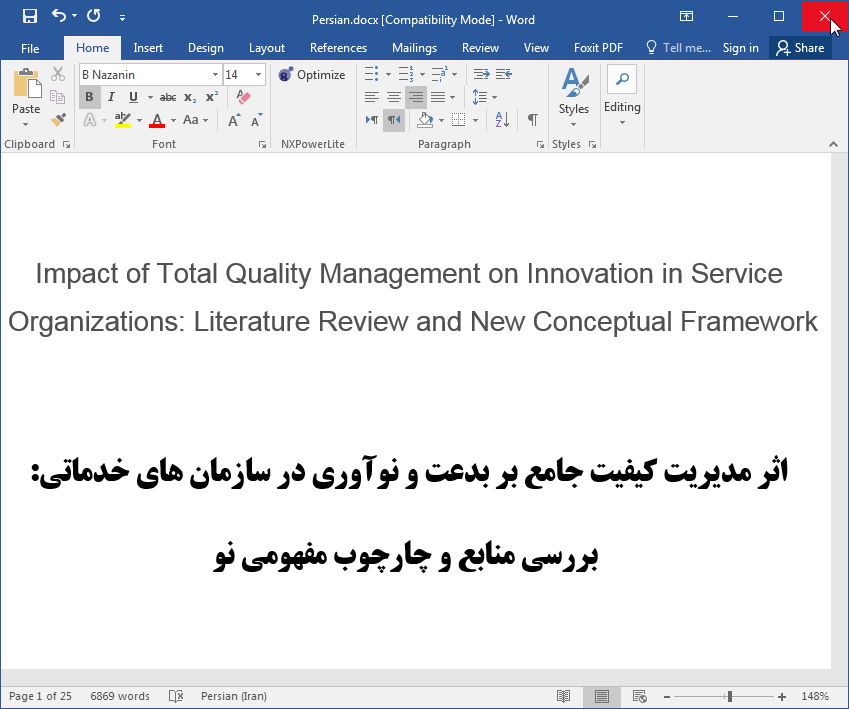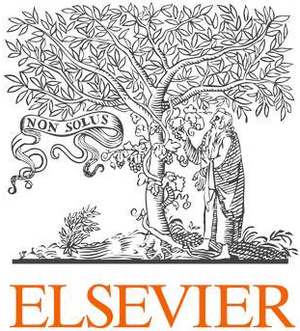بررسی منابع و چارچوب مفهومی جدید و تاثیر مدیریت کیفیت جامع (TQM) بر نوآوری در سازمان های خدماتی


19,600 تومانشناسه فایل: 5985
- حجم فایل ورد: 133.6KB حجم پیدیاف: 685.3KB
- فرمت: فایل Word قابل ویرایش و پرینت (DOCx)
- تعداد صفحات فارسی: 25 انگلیسی: 14
- دانشگاه:Faculty of Technology Management and Business Universiti Tun Hussein Onn Malaysia (UTHM), 86400 Parit Raja, Johor, Malaysia
- ژورنال: Procedia Engineering (8)
چکیده
هدف از این مقاله بررسی منابع و الفبای مربوط به رابطه بین مدیریت کیفیت جامع TQM و نوآوری در سازمان های خدماتی و ایجاد یک چارچوب مفهومی پژوهشی در مورد با این رابطه است. اخیرا مطالعات مربوط به روابط نوآوری TQM و نوآوری در صنایع خدماتی مورد بررسی قرار گرفته است. در مورد شیوه های TQM در سازمان های خدماتی بحث شده است و چارچوب و مدل مفهومی ارائه شده است.
مقدمه مقاله
اهمیت صنایع خدماتی به طور قابل توجهی در اقتصادهای ملی و بین المللی در حال افزایش است. در طول دو دهه گذشته سهم صنعت خدماتی در تولید ناخالص داخلی GDP افزایش یافته است. به گزارش اداره علم، تکنولوژی و صنعت (STI، 2008) سازمان همکاری و توسعه اقتصادی (OECD)، تا سال 2008 صنایع خدماتی در برخی از کشورها بیش از 70 درصد GDP را تشکیل داده اند (برای مثال، لوکزامبورگ 82%، یونان 78% و آمریکا 77%) (STI، 2008)، به شکل 1 را توجه کنید. افزایش رقابت در بازارهای ملی و جهانی اهمیت نوآوری خدماتی را به عنوان کلید رشد و توسعه بنگاه ها مشخص کرده است.STI OECD اظهار داشت: “اهمیت نوآوری خدماتی مشخص شده است اما بسیاری از بنگاه ها در حال جستجوی روش های جدیدی برای توسعه نوع نوآوری خدماتی مورد نیاز برای موفقیت در زنجیره های ارزش جهانی هستند.”

همانند کشورهای عضو OECD، صنایع خدماتی و کسب و کارهای خدماتی در کشورهای خارج از OECD نیز نقشی مهم و حیاتی در اقتصاد ملی دارند. به عنوان مثال، با توجه به مالزی، در سال 2009 سهم صنایع خدماتی مالزی 55 درصد از تولید ناخالص داخلی GDP بود. این صنایع بیشترین سهم در GDP و نرخ رشد سریع را در سازمان توسعه سرمایه گذاری مالزی MIDA دارند (گزارش عملکرد سرمایه گذاری در مالزی، 2011). در سال 2011، سهم صنایع خدماتی با نرخ رشد 6.8 درصد به 58.6 درصد از GDP رسید و 6.5 میلیون نفر را شامل می شود که 53 درصد کل اشتغال در سال 2011 است (گزارش عملکرد سرمایه گذاری در مالزی، 2011).
ABSTRACT Impact of Total Quality Management on Innovation in Service Organizations: Literature Review and New Conceptual Framework
Purpose of this paper is to review the literature on the relationship between total quality management TQM and innovation in services organization, and to develop a research conceptual framework on this relationship. The most recent studies investigated the TQM-innovation relationship and involved service industries in its scope have been reviewed. A discussion on the TQM practices in service organization is presented and conceptual framework and model are proposed.
Introduction
Importance of services industry is significantly increasing in local and international economics. During the last two decades contribution of the service industry to the Gross Domestic Product GDP has been a significantly increasing. According to Directorate for Science, Technology and Industry (STI, 2008) of the Organization for Economic Co-operation and Development (OECD), by 2008 service industry allocated in some countries more than 70 percent of GDP (e.g. Luxembourg 82%, Greece 78%, and USA 77%) (SIT, 2008), see figure 1. The increase of competition in local and global markets determined the importance of service innovation as a key source supports firms’ growth and development. STI OECD stated “the importance of service innovation is well-established but many firms are seeking new ways to develop the type of service innovation necessary for success in global value chains.” Similar to OECD countries, services industry and services business in none OECD countries have vital and crucial role in the local economics. Taking Malaysia as an example, in 2009 the Malaysian services industry contribution was 55% of GDP. It has the largest share of GDP and faster growth rate Malaysian Investment Development Authority MIDA, (Malaysian investment performance report, 2011). In 2011, the contribution of services industry increased to be 58.6% of the GDP with growth rate of 6.8 percent and accommodated employment of 6.5 million persons which is 53.3% of total employment in 2011 (Malaysian investment performance report, 2011). Such a huge economic activity by the service industry involves countless number of organizations, enterprises and firms. For example health care, transportation, education, government service, hotels and restaurants, telecommunication, financial services, social and personal services, retail and wholesale organizations. To compete well and increase their competitive advantage, these organizations need to be providing high quality and innovative services. Implementation of a Total Quality Management (TQM) system enhances the innovation process in organizations due to TQM elements such as continual improvement or customer focus (Baldwin & Johnson, 1996; Flynn, Schroeder, & Sakakibara, 1994, 1995). Both TQM and innovation have the same purposes and importance in organizations performance, especially in service industry. Both of them seek to integrate organization objectives and functions to satisfy the customers and increase competitive advantage (Karnak 2003). They involve all employees within an organization to be apart from the management process and business process. Furthermore, both provide a continual improvement and sustaining development (Oke, 2007; Singh & Smith, 2004; Talib, Rahman, & Qureshi, 2012). Continuous improvement, achieving customer satisfaction and open culture are main shared goals of TQM and innovation (Karnak, 2003; Kim, Kumar, & Kumar, 2012; D. Prajogo & Sohal, 2003). Thus relationship between TQM and innovation can determines the organization performance and its development. In the new context of economics and business excellence, TQM and Innovation became core elements in founding and increasing competitive advantage (Abrunhosa & Moura E Si, 2008; Hurme Lbma-Laukkanen, Sainio, & Jauhiainen, 2008; Mushtaq, Peng, & Lin, 2011). TQM and innovation have vital role on service business success. Importance of the relationship between TQM practices and innovation emerges from the importance of TQM and innovation in creating and strengthening competitive. Besides, both of them affect customer satisfaction which is top targeted goal of service organizations’ business (Mushtaq, et al., 2011; Pekovic & Galia, 2009). The need for quality and innovation in services organizations became vital for their business excellence and to compete through strengthen their competitive advantage (Juneja, Ahmad, & Kumar, 2011; Karani & Bichanga, 2012). This has driven and motivated many researchers to conduct studies in the relationship between TQM practices and innovation. The existing literature has provided fresh views and various approaches from different perspective into TQM practice-innovation relationship. However, some shortcoming notes appear from these studies. First, as most of empirical studies on TQM-innovation relationship conducted in manufacturing industry (Jitpaiboon & Rao, 2007; Teh, Yong, Arumugam, & Ooi, 2009) there is still need for more studies on this field in services industry (Ang, Lee, Tan, & Chong, 2011; Juneja, et al., 2011; Sit, Ooi, Loke, & Han, 2011). Second, the previous studies concluded contradicted results. Some found TQM has positive influence on innovation (e.g.Anm Hosa & Moura E Sa, 2008; Lopez-Mielgo, Mentes-Peon, & Vazquez-Ordis, 2009; Martinez-Costa & Martinez-Lorente, 2008; D. I. Prajogo & Hong, 2008; Sarkees & Hulland, 2009). While others found it has no impact on innovation (e.g, (Moura E Si & Abrunhosa, 2007; Pekovic & Galia, 2009; Santos-Vijande & Alvarez-Gonzalez, 2007). Thus, the gap still remains and debate still continuing concurrently with researchers investigating the impact of TQM on innovation. Third, within the existing literature, no such a conclusion recommended a specific TQM practice that lead to achieve both quality and innovation together in service organizations. Most of studies used different sets of TQM practices to examine its impact on innovation in all such as (Abrunhosa & Moura E Si, 2008) who examined each of autonomy, consultation, supporting people management practices and communication. While Satish and Srinivasan (2009) examined leadership, strategic planning, customer and market focus, information and analysis human resource focus, process management, supplier partnership and business results. Fourth, the previous empirical studies assessed impact of TQM practices in a specific type of innovation in manufacturing industries such as study of Abrunhosa and Sa dealt technological innovation and study of Prajogo and Sohal (2004) dealt with product innovation. However so far, no such study targeted the link between TQM practices with all different types of innovations in services industries. Thus, many questions emerge from existing literature: are TQM practices have any impact on innovation in service organizations? Which type of innovation that influenced more by TQM practices in service organizations? Are there specific TQM practices has more influence on innovation in services organizations?


- مقاله درمورد بررسی منابع و چارچوب مفهومی جدید و تاثیر مدیریت کیفیت جامع (TQM) بر نوآوری در سازمان های خدماتی
- تاثیر مدیریت کیفیت جامع بر نوآوری در خدمات سازمانها: بررسی ادبیات و چارچوب مفهومی جدید
- پروژه دانشجویی بررسی منابع و چارچوب مفهومی جدید و تاثیر مدیریت کیفیت جامع (TQM) بر نوآوری در سازمان های خدماتی
- اثر TQM بر نوآوری در سازمان های خدماتی
- پایان نامه در مورد بررسی منابع و چارچوب مفهومی جدید و تاثیر مدیریت کیفیت جامع (TQM) بر نوآوری در سازمان های خدماتی
- تحقیق درباره بررسی منابع و چارچوب مفهومی جدید و تاثیر مدیریت کیفیت جامع (TQM) بر نوآوری در سازمان های خدماتی
- مقاله دانشجویی بررسی منابع و چارچوب مفهومی جدید و تاثیر مدیریت کیفیت جامع (TQM) بر نوآوری در سازمان های خدماتی
- بررسی منابع و چارچوب مفهومی جدید و تاثیر مدیریت کیفیت جامع (TQM) بر نوآوری در سازمان های خدماتی در قالب پاياننامه
- پروپوزال در مورد بررسی منابع و چارچوب مفهومی جدید و تاثیر مدیریت کیفیت جامع (TQM) بر نوآوری در سازمان های خدماتی
- گزارش سمینار در مورد بررسی منابع و چارچوب مفهومی جدید و تاثیر مدیریت کیفیت جامع (TQM) بر نوآوری در سازمان های خدماتی
- گزارش کارورزی درباره بررسی منابع و چارچوب مفهومی جدید و تاثیر مدیریت کیفیت جامع (TQM) بر نوآوری در سازمان های خدماتی
